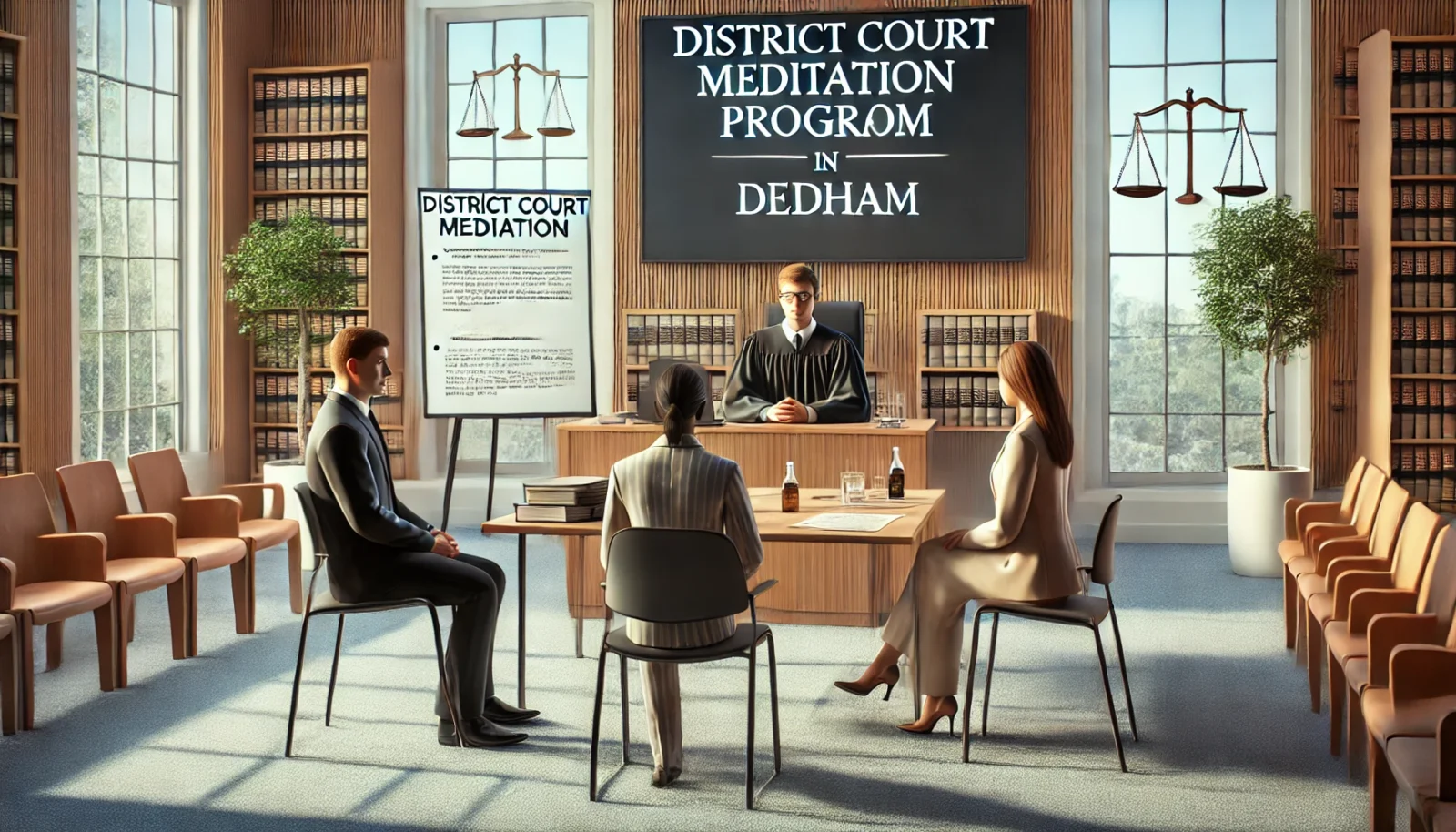Introduction to the Distroct Court Mediation Program in Dedham
A mediation program is a way for people to settle their legal disputes without going to trial. In the distroct court mediation program Dedham, trained mediators help both parties talk through their disagreements and reach a solution. This program is designed to save time and reduce stress by avoiding a full court case.
The distroct Court Mediation Program In Dedham to give people a faster and more peaceful way to resolve conflicts. It is especially helpful for cases like family disputes, civil issues, or small claims.
The benefits of mediation over traditional court cases are that it is usually quicker, costs less, and allows people to stay in control of the outcome. Both parties work together to find a solution, instead of leaving the decision to a judge.
What is Mediation and How Does It Work?
Explanation of the Mediation Process
In the distroct court mediation program Dedham, mediation is a process where both sides of a dispute meet with a neutral third person called a mediator. The mediator helps them communicate and work out a solution that both parties can agree on. Mediation is voluntary, meaning both sides must agree to participate, and the mediator does not make any decisions for them. Instead, the goal is for the parties to reach their own agreement.
Differences Between Mediation and Litigation
The main difference between mediation and litigation is how the conflict is resolved. In litigation, a judge or jury makes the final decision after hearing both sides in a trial. Mediation, on the other hand, gives control to the people involved, allowing them to come to an agreement on their own terms. Mediation is usually faster, less expensive, and less stressful compared to taking a case to trial.
The Role of Mediators in Resolving Disputes
In the distroct court mediation program Dedham, mediators are neutral professionals trained to help both sides communicate effectively. They do not take sides or give legal advice. Instead, they guide the conversation, help clear misunderstandings, and make sure that both sides are heard. The mediator’s role is to create a safe space for both parties to discuss their concerns and find common ground, leading to a peaceful resolution.
Types of Cases Handled by the Dedham Distroct Court Mediation Program
Common Cases That Go Through the Mediation Process
The distroct court mediation program Dedham handles a wide range of cases. Mediation is often used for disputes that are less complex and can be resolved without a full court trial. Some of the most common cases include disagreements between neighbors, contract disputes, landlord-tenant issues, and minor business conflicts.
Civil Disputes, Family Conflicts, Small Claims, and Other Eligible Cases
In Dedham, mediation is frequently used for civil disputes, which can include property disagreements, consumer issues, and contract misunderstandings. Family conflicts, such as child custody or divorce-related matters, are also suitable for mediation. Additionally, small claims cases, which involve financial disputes typically under a set limit, are often resolved through mediation. Other types of cases include personal disputes or minor criminal matters that do not require a court trial.
Examples of Successful Mediation Outcomes in Dedham
There have been many successful outcomes through the distroctcourt mediation program Dedham. For example, in a landlord-tenant dispute, mediation helped the parties agree on a payment plan for overdue rent without needing to go to court. In another case, mediation allowed two business partners to resolve a contract disagreement, avoiding the costs and delays of litigation. These examples highlight how mediation can offer peaceful, cost-effective solutions in Dedham.
Benefits of Choosing the Dedham Distroct Court Mediation Program
Faster Resolution of Cases
One of the biggest benefits of the distroct court mediation program Dedham is that it helps resolve cases much faster than going through a traditional court trial. Court cases can take months or even years to reach a conclusion, but mediation can often settle disputes in a matter of weeks or even days. This speed allows both parties to move forward without long delays.
Cost-Effectiveness of Mediation Compared to a Full Court Trial
Mediation is generally much more affordable than a full court trial. In a trial, legal fees and court costs can quickly add up. The Dedham distroct Court mediation program offers a cost-effective way to resolve disputes by cutting down on expensive legal proceedings, making it an appealing option for people looking to avoid high costs.
Less Stress and a Collaborative Approach to Dispute Resolution
Mediation is less stressful than going to court because it encourages cooperation rather than confrontation. In the Dedham distroct Court mediation program, both parties work together to find a solution that suits everyone. This collaborative approach reduces the emotional burden that often comes with court battles, as there is no winner or loser—just a mutually agreed-upon solution.
Preservation of Relationships Through Peaceful Resolution
One of the key advantages of mediation is that it helps preserve relationships, whether between family members, neighbors, or business partners. The Dedham distroct Court mediation program encourages peaceful communication and cooperation, which allows both parties to leave the process with a sense of resolution rather than hostility. By avoiding a bitter court battle, mediation can help maintain positive relationships moving forward.
Who Can Participate in the Distroct Court Mediation Program in Dedham?
Eligibility Criteria for Individuals or Parties
The distroct court mediation program Dedham is open to individuals and parties involved in civil disputes, family conflicts, small claims, and other eligible cases. To participate, the issue must be within the court’s jurisdiction and suitable for mediation, meaning the dispute can be resolved through mutual agreement rather than needing a legal ruling. This includes individuals, businesses, landlords, tenants, or anyone involved in disputes that do not require a full trial.
How Both Parties Need to Agree to Mediation
For mediation to take place, both parties must agree to participate in the process. The Dedham distroct Court mediation program is voluntary, meaning that no one can be forced into mediation. Both sides must be willing to engage in discussions and work together to find a solution. If one party does not agree, the case may move forward through the traditional court process.
The Voluntary and Confidential Nature of Mediation
Mediation in the Dedham distroct Court is entirely voluntary and confidential. The discussions that take place during mediation cannot be used in court if the mediation does not result in a settlement. This ensures that both parties can speak freely, knowing that their conversations are private and protected. The confidential nature of mediation helps create a safe environment for open communication, allowing both sides to explore options for resolving their dispute without the fear of legal consequences.
The Role of Mediators in the Dedham Distroct Court Program
Qualifications and Training of Mediators in Dedham
Mediators in the distroct court mediation program Dedham are highly trained professionals who specialize in conflict resolution. They undergo specific training in mediation techniques, communication skills, and conflict management. Mediators are often certified or have a background in law, social work, or psychology, giving them the tools to handle a wide range of disputes. Their qualifications ensure they are well-prepared to guide the mediation process effectively.
How Mediators Remain Neutral and Help Parties Find Solutions
One of the key roles of a mediator is to remain completely neutral throughout the mediation process. In the Dedham distroctCourt mediation program, mediators do not take sides, offer legal advice, or make decisions for the parties. Instead, they help facilitate discussions, encourage open communication, and guide both parties toward finding a mutually acceptable solution. By staying neutral, mediators ensure that both parties feel heard and respected, making it easier for them to work together.
The Importance of Impartiality in Resolving Disputes
Impartiality is critical in the Dedham distroct Court mediation program because it allows the mediator to gain the trust of both parties. A mediator who remains impartial helps create an environment where both sides can negotiate fairly and without bias. This level of trust is essential for resolving disputes, as it ensures that both parties are working toward a solution without feeling like the mediator is favoring one side over the other. Impartiality helps ensure a fair and balanced outcome for everyone involved.
Steps to Initiate the Mediation Process in Dedham Distroct Court
How to Request Mediation in Dedham
To initiate the mediation process in the Dedham distroct Court, either party involved in a dispute can request mediation by contacting the court or the mediation program directly. This can be done by filing a formal request with the court or through referral by a judge who believes the case may be suitable for mediation. Both parties must agree to participate in the mediation process. Legal representatives can also assist in submitting a request for mediation on behalf of their clients.
The Typical Timeline for Setting Up Mediation Sessions
Once mediation is requested and both parties agree, the Dedham distroct Court mediation program typically schedules a mediation session within a few weeks. The timeline may vary depending on the availability of the parties and the mediator. Once scheduled, the mediation session usually takes place in a neutral setting within the court or another agreed-upon location. Mediation is designed to resolve disputes quickly, so the sessions are often arranged to prevent lengthy delays.
What Happens During a Mediation Session
During a mediation session in the Dedham distroct Court program, both parties meet with the mediator in a neutral, confidential setting. The mediator will explain the process and ensure that each party has an opportunity to present their side of the dispute. The mediator will then facilitate open communication between the parties, helping them explore possible solutions. Mediation sessions focus on cooperation, and the mediator encourages the parties to find common ground. If both parties agree on a resolution, the terms are written down and can be legally binding if approved by the court. If no agreement is reached, the parties may proceed with the traditional court process.
What to Expect During a Mediation Session
Typical Flow of a Mediation Session
In the distroct court mediation program Dedham, a typical mediation session begins with the mediator explaining the rules and purpose of mediation. Both parties are then given a chance to share their side of the dispute without interruption. After this, the mediator helps guide the conversation, encouraging each party to discuss possible solutions. The session is focused on finding a resolution that both parties can agree on. Mediation sessions can last a few hours, depending on the complexity of the issue, but the goal is to keep it productive and focused on resolution.
How Mediators Facilitate Communication Between the Parties
Mediators in the Dedham distroct Court mediation program play an important role in keeping the conversation constructive. They make sure both sides are heard and help clarify any misunderstandings. If communication breaks down, the mediator can step in to refocus the discussion. Mediators encourage respectful dialogue, prevent arguments from escalating, and help both parties explore their options. By remaining neutral and providing guidance, mediators create an environment where both sides feel comfortable negotiating.
Common Outcomes of a Successful Mediation Session
A successful mediation session in Dedham often results in both parties reaching a mutually agreed-upon solution. The agreed resolution is usually documented and, if necessary, submitted to the court to become legally binding. Common outcomes include settlement agreements, payment plans, or behavioral commitments, depending on the nature of the dispute. In many cases, mediation leads to a resolution that saves both time and money, avoids the stress of a trial, and preserves relationships between the parties. If no agreement is reached, the parties may still take their case to court.
Legal Impact of Mediation Agreements
How Mediation Agreements Are Legally Binding
In the distroct court mediation program Dedham, once both parties reach an agreement during mediation, it can be legally binding. The agreement is documented in writing and signed by both parties, signifying their commitment to the terms. This written agreement serves as a contract, and both parties are expected to follow through on what was decided. Even though mediation is a voluntary process, the agreement itself carries legal weight if it is properly formalized.
The Process of Turning a Mediation Agreement into a Court Order
To ensure the mediation agreement is enforceable, it can be submitted to the Dedham distroct Court to become a court order. After the agreement is written and signed, either party or their lawyer can file the document with the court. A judge will review the terms to ensure they are fair and reasonable. Once approved, the court can issue an official order that reflects the mediation agreement. This step solidifies the agreement and makes it enforceable under the law.
What Happens If One Party Does Not Comply with the Agreement
If one party fails to comply with the mediation agreement after it has been turned into a court order, the other party can return to court to seek enforcement. Non-compliance with a legally binding mediation agreement is treated like any other violation of a court order. The court may impose penalties, fines, or other legal consequences to ensure compliance. In some cases, the non-compliant party may face additional legal action, including contempt of court.
How the Dedham Distroct Court Mediation Program Saves Time and Resources
Comparison of Mediation Versus Traditional Court Proceedings
The distroct court mediation program Dedham offers a much quicker resolution process compared to traditional court proceedings. Court trials can take months or even years to resolve, with lengthy legal procedures, multiple hearings, and the need for legal representation. In contrast, mediation allows parties to resolve disputes in a matter of days or weeks. Mediation sessions are informal and focused on reaching a solution, avoiding the time-consuming steps of formal litigation. This makes mediation a faster and more efficient way to handle disputes.
How the Mediation Program Alleviates the Court System’s Workload
By resolving disputes through mediation, the Dedham distroct Court reduces the number of cases that need to go to trial. This alleviates the burden on judges, court staff, and the overall legal system, freeing up resources for more complex cases that require judicial intervention. The mediation program helps streamline the court’s operations by handling smaller disputes out of court, ensuring that the legal system can focus its resources where they are most needed.
Benefits of an Out-of-Court Settlement
An out-of-court settlement through the Dedham distroct Court mediation program offers several key benefits. It is typically more cost-effective, as parties avoid expensive legal fees and court costs. It is also less adversarial, reducing the stress and hostility often associated with court trials. Both parties have more control over the outcome in mediation, as they work together to find a solution that meets their needs. This collaborative approach often leads to better long-term results and helps preserve relationships, making mediation a practical and resource-saving alternative to traditional court proceedings.
Testimonials and Success Stories from Dedham’s Mediation Program
Real-Life Examples of Cases Successfully Resolved Through Mediation
The distroct court mediation program Dedham has helped resolve a wide range of disputes. For example, a small business owner and a supplier had a contract disagreement over late payments. Instead of going through a costly court trial, they participated in mediation and reached an agreement on a new payment plan, allowing their business relationship to continue. In another case, a landlord and tenant were able to resolve a rent dispute, agreeing to a fair settlement without resorting to eviction or legal battles.
Client Satisfaction and Feedback from Participants in the Dedham DistroctCourt Mediation Program
Participants in the Dedham distroct Court mediation program often express high levels of satisfaction with the process. Many appreciate the speed and efficiency of mediation compared to lengthy court cases. Clients report that mediation helped reduce the stress and emotional strain of their disputes. One participant said, “Mediation saved us time and money, and we were able to walk away with a solution we both felt good about.” Another noted, “The mediator was fair and professional, and I felt like my voice was heard throughout the process.” These testimonials reflect the program’s success in providing peaceful and effective resolutions.
Why the Distroct Court Mediation Program in Dedham is Gaining Popularity
The Growing Interest in Alternative Dispute Resolution Methods
The distroct court mediation program Dedham is gaining popularity as more people recognize the value of alternative dispute resolution (ADR) methods. Mediation, a key part of ADR, offers a less formal, quicker, and more cost-effective way to resolve disputes compared to traditional court trials. As court cases become increasingly time-consuming and expensive, many people are turning to mediation as a practical solution for resolving conflicts.
Public Perception of the Mediation Process
The public perception of mediation has also shifted in a positive direction. Many individuals and businesses see mediation as a collaborative and less confrontational way to settle disputes. The Dedham distroct Court mediation program has been praised for its fairness and efficiency, with participants often expressing relief at avoiding a lengthy court battle. The confidential nature of mediation and the opportunity for both parties to have control over the outcome contribute to the growing trust in this process.
The Potential for Mediation Programs to Expand in Other Regions
As the success of the Dedham distroct Court mediation program becomes more widely known, there is potential for similar programs to expand in other regions. With courts across the country facing backlogs and increasing demands on resources, mediation programs are seen as a way to alleviate pressure on the legal system. The popularity of the Dedham program shows that mediation can provide a valuable service, not only in resolving disputes efficiently but also in promoting positive outcomes that benefit all parties involved. Other regions may adopt or expand similar programs to meet the growing demand for alternative dispute resolution.
Conclusion
The distroct court mediation program Dedham offers an effective, efficient, and peaceful way to resolve disputes without the need for a lengthy and costly court trial. Through mediation, both parties can work together to find a solution that meets their needs, with the help of a neutral mediator. This process saves time, reduces stress, and often preserves relationships. As more people turn to alternative dispute resolution methods like mediation, the Dedham distroct Court program continues to grow in popularity, providing a model for how disputes can be settled fairly and efficiently.
FAQs About the Distroct Court Mediation Program in Dedham
What types of cases are eligible for the distroct Court Mediation Program in Dedham?
The distroct court mediation program Dedham handles a variety of cases, including civil disputes, family conflicts, small claims, and business disagreements. It is best suited for cases that can be resolved through mutual agreement rather than a court ruling.
Is mediation in Dedham legally binding?
Yes, if both parties reach an agreement during mediation, it can be documented and made legally binding by submitting it to the court. Once approved by a judge, it becomes enforceable like any other court order.
How long does mediation take compared to a court trial?
Mediation is generally much faster than a traditional court trial. While court cases can take months or years, mediation often resolves disputes in days or weeks, depending on the complexity of the case.
What happens if one party doesn’t follow the mediation agreement?
If one party fails to comply with the mediation agreement, and it has been turned into a court order, the other party can seek enforcement through the court. Non-compliance can result in penalties or further legal action.
Is mediation voluntary in the Dedham distroct Court program?
Yes, mediation is voluntary, meaning both parties must agree to participate. If either party does not want to mediate, the case can proceed through the traditional court process.
Is mediation confidential?
Yes, mediation in the Dedham distroct Court is confidential. The discussions that occur during mediation cannot be used in court if the parties do not reach an agreement.
Can I still go to court if mediation doesn’t work?
If mediation does not result in an agreement, the parties can take their dispute to court and go through the standard legal process to resolve the issue.
Read For More Amazing Blogs Law Firm Genius.














Got a Questions?
Find us on Socials or Contact us and we’ll get back to you as soon as possible.